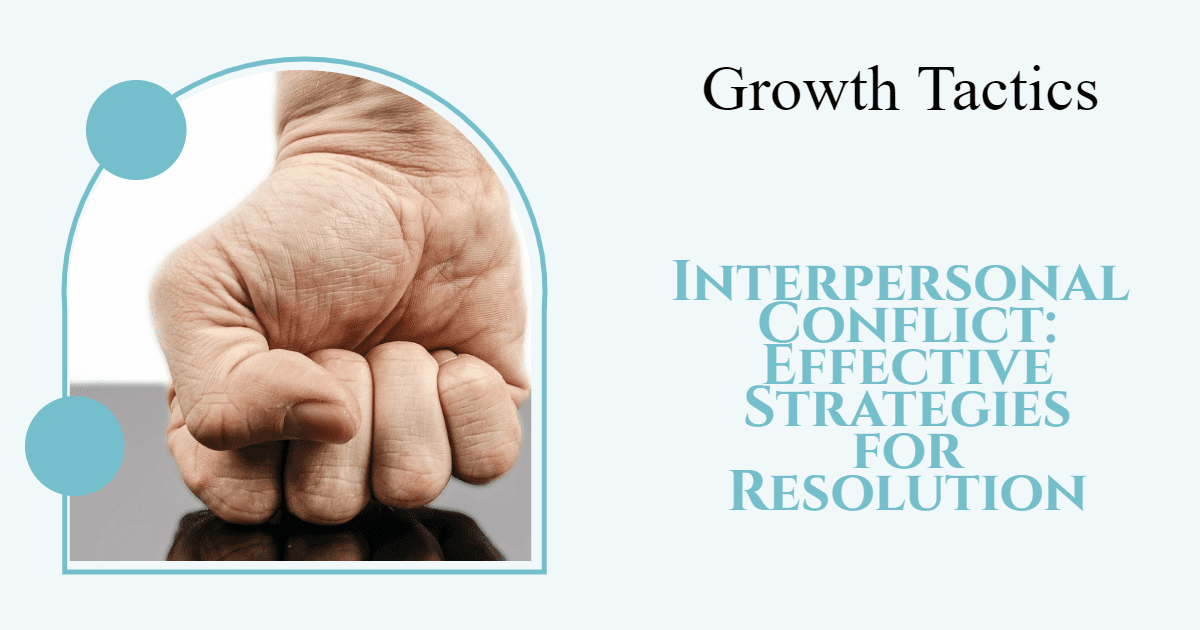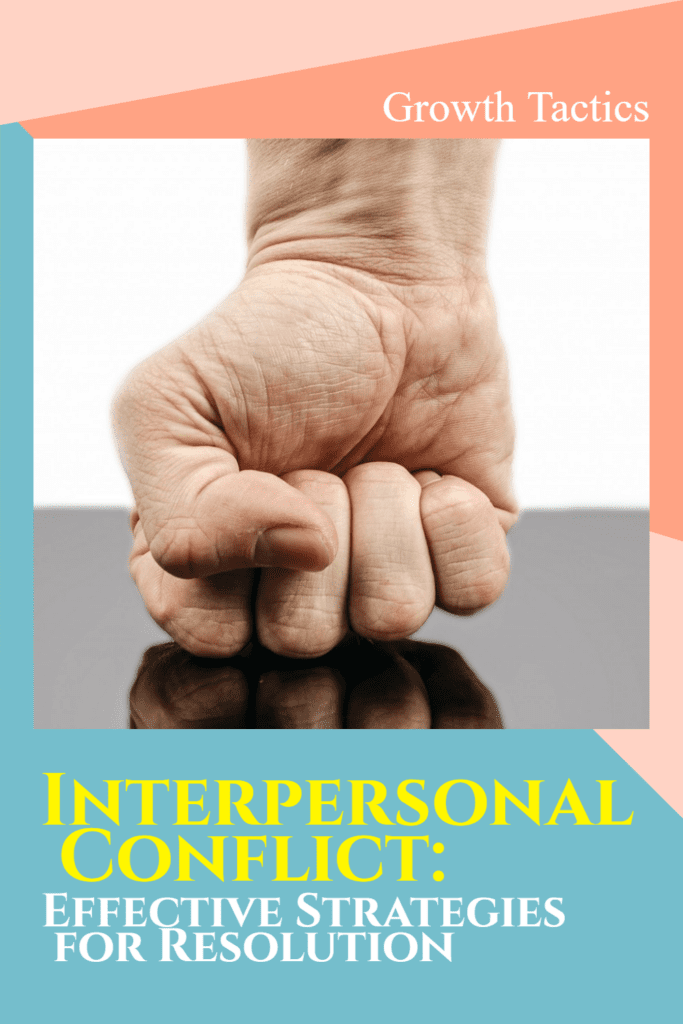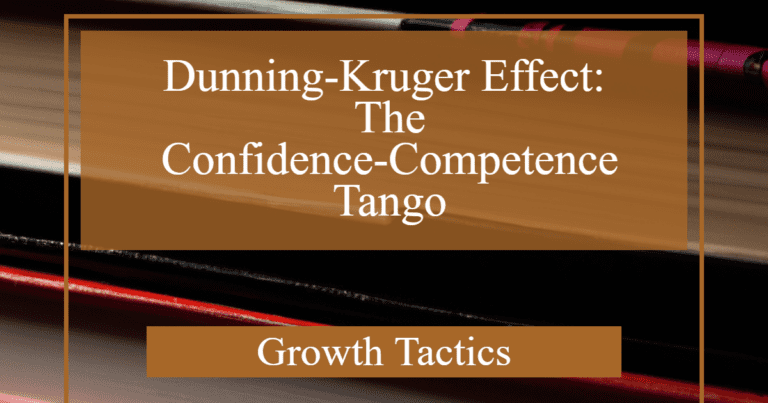Interpersonal conflict is an inevitable part of human relationships and can arise in various contexts, such as personal relationships, workplaces, and social settings. It refers to a conflict that occurs between two or more individuals due to differences in values, opinions, or goals.
Conflict can be distressing and destructive if not managed effectively, but with the right strategies, it can also be an opportunity for growth and resolution. In this article, we will explore effective strategies for resolving interpersonal conflict and building healthier relationships.
Jump To Section
Types of Interpersonal Conflict
Value Conflict
Value conflicts occur when individuals hold different beliefs, values, or ethical principles. These conflicts often arise when individuals have different cultural backgrounds, religious beliefs, or personal experiences that shape their values. Resolving value conflicts requires open-mindedness, empathy, and respect for differences.
To effectively manage value conflicts, individuals should engage in active listening and try to understand the underlying motivations and reasons behind each other’s values. It is important to approach these conflicts with a willingness to learn and broaden one’s perspective. By acknowledging and respecting each other’s values, individuals can find common ground and work towards a mutually acceptable solution.
Relationship Conflict
Relationship conflicts are interpersonal conflicts that stem from personal issues or misunderstandings between individuals. These conflicts can arise from differences in communication styles, expectations, or past experiences. Relationship conflicts can be emotionally charged and often require careful navigation to avoid further damage.
To manage and resolve relationship conflicts, it is important to build effective communication skills. This includes active listening, expressing emotions constructively, and seeking to understand the other person’s perspective. Developing a deeper understanding of each other’s needs, fears, and motivations can help individuals find common ground and build healthier relationships.
Task Conflict
Task conflicts occur when there are differences in opinions, ideas, or approaches related to a specific task or project. These conflicts often arise in workplace settings where team members have different perspectives on how to achieve a common goal. Task conflict, when managed effectively, can lead to creative solutions and innovation.
To resolve task conflicts, it is important to focus on the common goal and objective. Active listening and open communication are key in understanding each other’s perspectives and brainstorming potential solutions. Collaboration and compromise are crucial in finding a resolution that takes into account different viewpoints and utilizes the strengths of each team member.
Ego Conflict
Ego conflicts arise from personal pride, competition, or the need to prove oneself. These conflicts often stem from individuals’ insecurities and can escalate quickly if not managed properly. Ego conflicts can be destructive to relationships and hinder effective communication.
Managing ego conflicts requires individuals to set aside personal biases and practice self-reflection. It is important to identify one’s own ego-driven behaviors and motivations and work towards prioritizing the collective well-being and the resolution of the conflict. By focusing on the larger goals and maintaining a sense of humility, individuals can overcome ego conflicts and build healthier and more productive relationships.
Conflict Management Strategies
Assertiveness
Assertiveness is an important conflict management strategy that involves expressing one’s needs, concerns, and boundaries clearly and respectfully. It requires individuals to advocate for their own rights and communicate their viewpoints effectively. Assertive communication allows for open and honest dialogue, enabling individuals to address conflicts directly without resorting to aggressive or passive behavior. By asserting oneself assertively, individuals can establish clear expectations, set healthy boundaries, and work towards resolving conflicts in a constructive manner.
Mediation
Mediation is a conflict management strategy that involves the intervention of a neutral third party to facilitate dialogue and resolution between conflicting parties. The mediator’s role is to guide the individuals involved in the conflict toward finding common ground and reaching a mutually agreeable solution. They provide structure to the conversation, help identify underlying concerns, and assist in generating options for resolution. The mediator remains impartial and promotes effective communication, ensuring that all voices are heard and considered. Mediation can be particularly useful when there is a power imbalance, complex conflicts, or a breakdown in direct communication between the parties.
Negotiation
Negotiation is a conflict resolution strategy that focuses on finding a mutually acceptable solution through compromise and bargaining. It involves open discussion and exchanging offers and counteroffers to reach a middle ground. Negotiation requires effective communication skills, active listening, and a willingness to explore creative alternatives. The process involves understanding each party’s interests, generating multiple solutions, and working toward an outcome that satisfies everyone involved. Negotiation encourages collaboration and constructive problem-solving, aiming for a win-win resolution.
Emotional Intelligence
Emotional intelligence plays a vital role in conflict management. It refers to the ability to recognize and manage emotions, both in oneself and others. In conflicts, emotions often run high, and individuals may become reactive or defensive. Emotional intelligence allows individuals to regulate their own emotions, understand others’ emotional states, and respond with empathy and understanding. By recognizing and managing emotions effectively, individuals can approach conflicts more constructively, defuse tension, and build stronger relationships.
Problem-Solving
Problem-solving is a conflict management strategy that focuses on identifying the root causes of a conflict and working collaboratively to find solutions. It requires a systematic approach to address the underlying issues rather than focusing on surface-level symptoms. Problem-solving involves gathering relevant information, evaluating options, and making decisions as a group. By engaging in structured problem-solving processes, individuals can generate creative solutions, consider multiple perspectives, and work together toward a resolution that satisfies the needs and interests of all parties involved.
Each conflict situation is unique, and the most effective strategy may vary depending on the context and individuals involved. Adapting and combining different conflict management strategies may be necessary to find the most suitable approach for resolving a specific conflict.
The Importance of Empathy
Empathy plays a vital role in conflict management as it allows individuals to understand and connect with the emotions and perspectives of others involved in the conflict. When people empathize with one another, they can demonstrate genuine concern and validation for each other’s feelings and experiences. By recognizing and acknowledging differing viewpoints with empathy, individuals are more likely to foster an environment that encourages open dialogue and understanding.
Empathy helps to create a foundation of trust and respect, which are crucial for reaching a resolution that satisfies the needs and interests of all parties involved. It allows individuals to put themselves in someone else’s shoes, fostering compassion and the ability to see the conflict from multiple angles. By considering different perspectives and practicing empathy, individuals can humanize the other individuals involved in the conflict, promoting a spirit of collaboration and cooperation.
Cultural Considerations
Conflict management strategies can vary significantly across different cultures. Recognizing and addressing cultural diversity is essential to navigating conflicts in multicultural settings and promoting understanding and inclusion. Different cultures may have distinct communication styles, conflict resolution norms, and values. Individuals need to be sensitive to these cultural differences to avoid misunderstanding or escalating conflicts further.
Understanding cultural considerations can help individuals approach conflicts with cultural awareness and adapt their conflict management strategies accordingly. For example, in some cultures, direct confrontation may be perceived as disrespectful, while in others, an assertive approach may be expected. By recognizing and respecting cultural differences, individuals can bridge cultural gaps and find common ground more effectively.
Power Dynamics
Power dynamics can greatly influence conflicts. Power imbalances within a relationship or a group can impact communication, decision-making processes, and the overall resolution of conflicts. It is important to address power differentials to ensure fairness and equitable outcomes.
Recognizing the impact of power dynamics involves acknowledging any imbalances, explicit or implicit, that may exist. Individuals in positions of power should be conscious of their influence and strive to create an environment where all voices are heard and valued. Strategies for mitigating the impact of power differentials may include encouraging the participation of marginalized voices, establishing inclusive decision-making processes, and actively working towards balancing power within the conflict resolution process.
Conflict Escalation and De-escalation
Conflict escalation refers to the process by which a conflict intensifies and becomes more difficult to resolve. Recognizing signs of escalation is crucial for addressing conflicts before they spiral out of control. Understanding the stages of conflict escalation, such as tension, hostility, and aggression, can help individuals intervene promptly.
To de-escalate conflicts, techniques, and strategies can be employed. These may include:
-
Active listening: Allow each party to express their concerns and feelings without interruption. This demonstrates respect and can help defuse tension.
-
Open and respectful communication: Encourage open dialogue and establish ground rules for communication. Use “I” statements instead of accusatory language to express concerns and encourage a non-confrontational atmosphere.
-
Collaborative problem-solving: Encourage all parties to actively participate in finding a solution that satisfies everyone’s needs. This encourages cooperation rather than competition.
-
Mediation: Engage a neutral third party to facilitate the resolution process. Mediators can guide the conversation, ensure fairness, and help find common ground.
-
Taking a time-out: When emotions are running high, taking a break from the conflict can be beneficial. It allows individuals to cool down, reflect, and come back to the discussion with a calmer mindset.
By understanding conflict escalation and employing de-escalation techniques, individuals can prevent conflicts from escalating further and explore constructive ways to address the underlying issues at hand.
The Role of Trust-Building
Trust is a foundational element in conflict resolution. Building trust creates an atmosphere of mutual respect, understanding, and reliability, which is essential for reaching successful resolutions.
Strategies for building trust include:
-
Being reliable and consistent: Follow through on commitments and demonstrate consistency in words and actions. This helps build confidence that agreements and promises will be upheld.
-
Effective communication: Be transparent and honest in your communication, actively listen to others, and respond to their concerns with empathy and understanding.
-
Addressing past grievances: Acknowledge and address any past conflicts or grievances. This shows a willingness to learn from the past and move forward constructively.
-
Sharing vulnerability: Openly expressing vulnerabilities can help foster trust. It promotes a sense of authenticity and encourages others to reciprocate, creating a safe space for open dialogue.
-
Establishing clear expectations: Clearly define expectations, boundaries, and responsibilities to ensure everyone is on the same page. This helps minimize misunderstandings and build trust through shared understanding.
Building trust takes time and effort, but its impact on conflict resolution is invaluable. It establishes a solid foundation for future interactions, strengthens relationships, and facilitates more productive and collaborative conflict resolution processes.
Conflict Resolution in Different Settings
Conflict management strategies can vary depending on the setting in which the conflict arises. Different contexts, such as personal relationships, professional environments, or community settings, require different approaches to conflict resolution.
For personal relationships, it is important to prioritize open communication, actively listen to each other’s needs, and find compromise. Applying active listening techniques, engaging in empathy, and seeking win-win solutions can help maintain healthy relationships.
In professional environments, conflicts may arise due to differences in opinions, workplace dynamics, or role expectations. Conflict resolution techniques should focus on finding common ground, understanding different perspectives, and fostering a collaborative work environment.
In community contexts, conflicts often involve multiple stakeholders with diverse interests. Collaborative problem-solving, community engagement, and mediation techniques can be effective in resolving conflicts and promoting community harmony.
It is crucial to tailor conflict resolution techniques to specific settings by considering the individuals involved, the nature of the conflict, and the desired outcomes. By applying appropriate strategies, individuals can navigate conflicts in various settings more effectively and promote positive resolutions.
Conclusion
Interpersonal conflict is an inevitable part of human relationships, but with effective conflict resolution strategies, conflicts can be managed and resolved constructively. By understanding the different types of conflict, utilizing appropriate conflict management strategies, and considering the role of communication and culture, individuals can build healthier relationships and foster productive environments. Conflict resolution is a skill that can be developed and refined, leading to stronger connections and personal growth.








